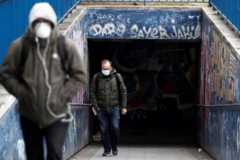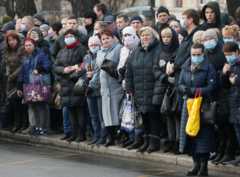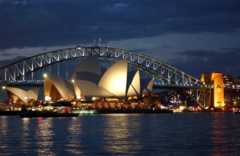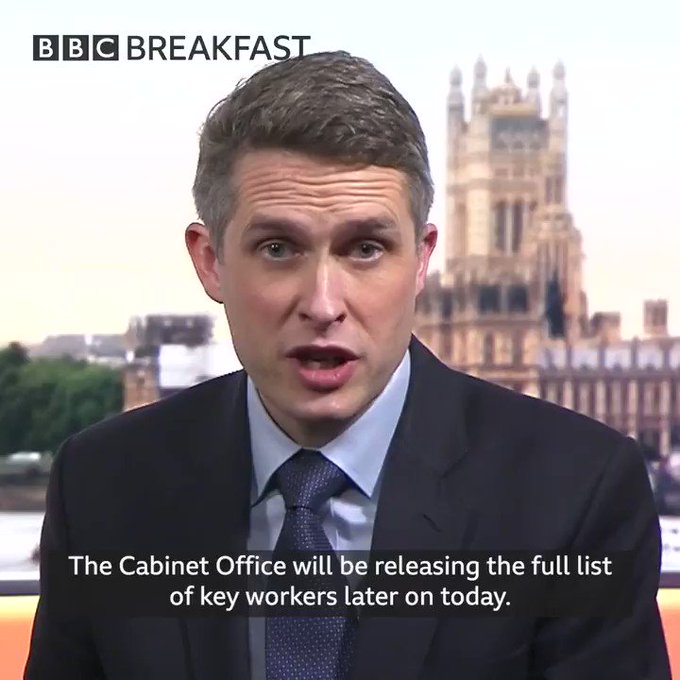Live Reporting
- The much anticipated reunion of Friends may be delayed because of the virus. That's at least according to US magazine Variety.Filming was due to begin next week but has now been put on hold until at least May, according to Variety's sources.The one-off special, more than 15 years since the hit show ended, had drawn widespread attention when it was announced just last week.
- You can hardly avoid them now on the city streets of Asia and Europe but do those masks people are putting on actually offer much protection against coronavirus?This is what Dr Shunmay Yeung of the London School of Hygiene and Tropical Medicine has to say.
Video content
- Defence Secretary Ben Wallace has announced a new military force ready to support public services as required during the coronavirus crisis.As part of the support the Army will provide during the pandemic, the number of troops at a heightened state of readiness will be doubled to 20,000 and Reserves will be placed on standby.The Ministry of Defence is also planning to train 150 military personnel to drive oxygen tankers around the country to support the NHS.Scientists from the Defence Science and Technology Laboratory (Dstl) will also help Public Health England’s effort to understand the virus and tackle the spread.
- Fatalities continue to climb in Europe, as Italy extends its lockdown after announcing the biggest rise yet with 475 deaths within 24 hours. But there's been praise for the European Central Bank’s €750bn (£700bn; $820bn) shot in the arm to cover sovereign bonds and corporate debt in the eurozone.“Extraordinary times require extraordinary action,” said ECB chief Christine Lagarde, and markets in Europe in Milan and Paris recovered some ground on Thursday morning.Russia has recorded its first official death, Belgium has announced another seven and Denmark has recorded two more, bringing its total number to six.Italy is likely to to overtake China’s official fatality number of 3,245 in the pandemic on Thursday. On Wednesday night, a column of some 30 military vehicles could be seen in the centre of Bergamo moving around 70 coffins to crematoria outside the city as the local cemetery could no longer manage, Ansa news agency reports.Italian and French authorities are angry too many people are flouting lockdown measures.Italian Prime Minister Giuseppe Conte has appealed for common sense and one minister says a “complete ban on outdoor activity” must be considered.French Interior Minister Christophe Castaner has said “some people think they’re some kind of modern-day hero when they break the rules - but they’re imbeciles, and a danger to themselves”.King Felipe of Spain made a powerful televised address on Wednesday night, telling Spaniards “the virus will not defeat us but on the contrary it will make us stronger as a society". Covid-19 has hit Spain particularly hard, with at least 79 deaths reported in residential care homes.
- The prime minister has said the country's lockdown measures will be extended - they currently run to 3 April. It will not be possible to return immediately to life as before, even after the worst is over, Giuseppe Conte added.Northern Italy is particularly affected by the outbreak, with doctors forced to make decisions about which patients to give intensive care treatment to. More than 2,900 people have now died in the country, just 300 fewer than the total number of deaths in China.
- In the Philippines, housebound social-media users have been making light of President Rodrigo Duterte’s call to “take a vacation at home” as the country’s main island, Luzon, is placed under strict quarantine measures to slow the spread of Covid-19.During an address to the nation last week President Duterte encouraged people to stay in their homes, adding: “Walk around your house. Maybe you haven’t visited some parts of it yet.”Filipino netizens responded by posting pictures and videos of themselves backpacking around their apartments, or lying on top of wardrobes and sitting inside cupboards.
- Michel Barnier, the EU's chief Brexit negotiator, has tested positive for coronavirus.Mr Barnier said he was "doing well and in good spirits" in a tweet announcing his diagnosis on Thursday.His diagnosis throws the process of negotiating a post-Brexit trade deal between the EU and the UK into doubt.Mr Barnier had been due to hold talks in London this week, but they were cancelled due to the coronavirus pandemic.The post-Brexit transition period, under which the UK will continue to follow EU rules, will end in December and Prime Minister Boris Johnson has vowed not to extend it.
- Many commuters still having to use the London Underground have been critical of the decision to shut up to 40 stations.Some have tweeted pictures of packed carriages despite the UK government's pleas for people to avoid "non-essential" travel and contact with others.One passenger, Lorraine Price, tweeted: "I feel we are the dumbest nation in the world, reduced services on #tfl and overcrowding as a result in the fastest growing coronavirus part of the country."But others welcomed the move, with one Twitter user posting: "I think it's great TFL are closing stations because people clearly don’t understand staying home."
- Africa has so far been spared a major outbreak of coronavirus but World Health Organization director Tedros Adhanom Ghebreyesus has warned the continent should “wake up” and prepare for the worst.On Wednesday, Burkina Faso registered the first death in sub-Saharan Africa - Rose-Marie Compaore, the first-vice president of parliament. She was 62 and suffering from diabetes.Several African countries have imposed stringent measures to guard against the virus:
- South Africa has ordered all bars to close, or limit their patrons to a maximum of 50, at risk of a fine or even imprisonment; it has also banned all cruise ships from its ports
- Kenya, a deeply religious country like most on the continent, has suspended worship in some churches and mosques, and the government says it will manufacture its own hand sanitiser and distribute it for free, in a bid to tackle shortages
- Uganda and Botswana have closed all schools
- Chad has suspended all passenger flights and closed some land borders
- Liberia, which has confirmed one case so far, has stopped issuing passports to stop people travelling and potentially pick up the virus abroad
- Mauritius, an Indian Ocean tourist hot spot, has confirmed its first three cases – two cruise ship workers and a British tourist
- Some of the symptoms of coronavirus are quite similar to that of the common cold or flu - but there is a difference. Watch as the BBC's Laura Foster breaks it down for you, and find out what to do if you're in the UK and think you might have the virus.
Video content
- Official media in Iran are urging Iranians to cancel travel plans for new year – or Nowruz – festivities, which begin tomorrow."Nowruz trips are like welcoming death” is how state radio station opened its news bulletins this morning as images of large traffic jams on Iranian roads flooded social media.Iran yesterday recorded 17,361 confirmed Covid-19 cases, with an official death toll of 1,135.
- There’s been a lot of uncertainty about how school closures and exam cancellations are going to affect pupils.One A-level student, Ryan English, told the BBC News Channel he was "very concerned"."Many students like myself in their final year of A-levels are sitting on offers for university, and predicted grades can sometimes be lower than these offers, such as my insurance offer," he said."I'm afraid that if they do give these predicted grades then students like myself stand to lose out on future opportunities."The education secretary has said more details will be given on Friday on how pupils will be awarded grades in the absence of exams.
- Covid-19 has struck one of the lifelines of India's financial hub, Mumbai - the dabbawalas, the thousands of men who deliver freshly cooked meals from homes to offices across the city.They announced on Thursday that they would be pausing delivery until 31 March. They deliver some 200,000 tiffin boxes every day - and have made global headlines over the years for their efficiency.While their decision to stop deliveries now is bound to inconvenience people, Mumbai is also under a partial shutdown with schools, colleges, malls and other public places closed, and people being encouraged to stay home or work from home if possible.Maharashtra, the state where the city is located, has reported the highest number of cases, 45. India has 148 active coronavirus cases.
- There has been a lot of speculation that UK's capital could soon be put on “lockdown”, with the Telegraph reporting it may happen “by the weekend”.Cabinet minister Gavin Williamson told Radio 4’s Today programme the government had “no plans to do this at the moment” but that the prime minister would “deal with difficult decisions”.On Wednesday, Boris Johnson said “we live in a land of liberty” but added that he would “rule nothing out” when asked about whether London faced a possible shutdown like other European cities.
- The country's coronavirus monitoring centre confirmed the death of an elderly woman with the virus at a hospital in Moscow.The 79-year-old tested positive after being taken to hospital last Friday, the centre said.The woman, who died of pneumonia in intensive care, had other severe health conditions, including type 2 diabetes and coronary heart disease."The patient’s close contacts have been identified and put under medical observation. None of them has severe symptoms of the disease," the centre said.Russia has identified 147 cases of coronavirus so far, with the majority in Moscow, state news agency Tass says.Russian President Vladimir Putin has said the situation with coronavirus in the country is "under control".
Video content
- Until a few weeks ago in the UK, isolating yourself and distancing yourself from other people were seen as unusual, even a sign of being unwell. Now, they've become essential measures to stem the spread of the virus.The two are not quite the same. Social distancing involves cutting down on non-essential travel and interactions, staying home if you're unwell, and not visiting social venues.Self-isolation means you basically have to cut yourself off entirely from the outside world – here’s how to do it.
Video content
- Good morning,A lot has happened in the past 24 hours as the world tries to grapple with the coronavirus pandemic.Here is an overview of the latest key developments:
- China reported no new domestically transmitted cases in the country for the first time since the virus emerged in late December
- The lockdown in the Chinese city of Wuhan could be lifted once there are no new cases for 14 days, the China Daily newspaper reports
- Hokkaido, the worst-affected Japanese region, is lifting its state of emergency after officials said the spread of the virus appeared to be ending
- China is among several Asian countries facing a second coronavirus wave, spurred by people importing it from outside
- Australia and New Zealand closed their borders to foreigners, the latest countries to do so worldwide
- The European Central Bank (ECB) launched an emergency €750bn ($820bn; £700bn) package to ease the impact of the coronavirus pandemic
- Donald Trump called himself a “war-time president” as he enacted powers to ramp up production of vital medical supplies
- In the UK, schools and dozens of London Underground stations are to be shut
Also, should you have any questions about coronavirus, we're running a separate live page, where BBC experts are offering their expertise. You can visit the live page here. - Australia’s absolute ban on foreign travellers from Friday night is a dramatic step – but one Prime Minister Scott Morrison said was crucial to slow the spread of Covid-19.Earlier travel bans – and the prospect of quarantine for those who were allowed in - had already reduced travel to Australia to one-third of normal levels.But stopping all but Australian citizens and residents entering the country will soon cut international arrivals to a trickle – mainly Aussies abroad heeding government advice to head home as soon as possible.Qantas has agreed to keep services going from key locations to enable those repatriations, the PM said.“About 80% of the cases we have in Australia are either the results of someone who has contracted the virus overseas or someone who has had direct contact with someone who has returned from overseas," Mr Morrison added."So, the overwhelming proportion of cases in Australia have been imported.”
- Is it safe to swim in a public pool? If you recover from coronavirus are you immune? And how long does the virus stay active on surfaces?Our experts are answering your key questions throughout the day, whether that be online, live on TV or on radio.So far we've received more than 50,000 questions from the public since the coronavirus outbreak started.To get in touch with your question, email YourQuestions@bbc.co.uk or tweet us using the hashtag #BBCYourQuestionsTo read some of the answers, click here.















No comments:
Post a Comment